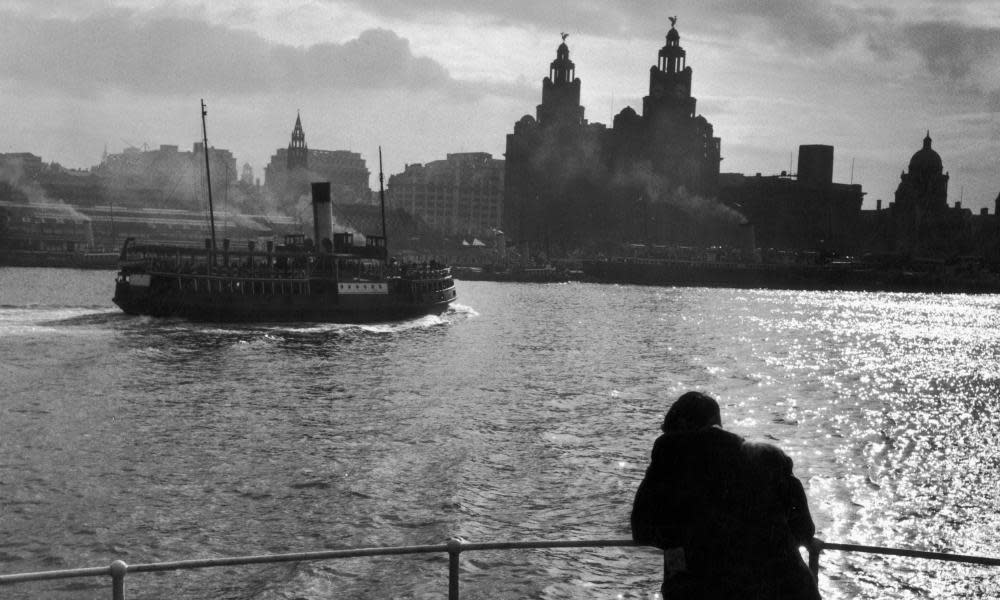Ghost Town by Jeff Young review – a book of beauty and longing

Retracing his past through the labyrinth of old Liverpool, Jeff Young has conjured a book of plangent beauty and longing. Ghost Town is in essence a memoir, but within its short span it contains multitudes: a meditation on loss, a family album, an ode to the power of reading, a loving memorial to a city, and a long goodbye. Young is a playwright-essayist-lecturer of local renown whose work deserves national recognition and may get it: the book was recently shortlisted for the Costa biography award.
Born in the late 1950s, the author is just old enough to remember the terraced streets of his Everton neighbourhood before it was razed to the ground. He can still sense the ghosts – of his blind grandfather, of his parents, of his sister Val – as he takes long, obsessive walks around a city that has been disappearing all his life. It’s partly the Liverpool of Terence Davies’s cine-memoir Distant Voices, Still Lives, a place of tenderness and togetherness but also of violence and trauma: a stay in a grim fever hospital as an eight-year-old comes back to trouble him. An “invisible boy” who hated school, Young found a refuge, a whole world, in books, none more formative than A Kestrel for a Knave. Inspired by Billy Casper with his hawk, he discovers through reading a spirit of creativity that is close to love. Unlike Billy, he will transcend his “scrapheap education” and thrive.
Young doesn’t just absorb books, he inhabits them and identifies his own life in their pages
Doubles, alter egos, shadow selves throng this narrative. Young doesn’t just absorb books, he inhabits them and identifies his own life in their pages. When he starts as a filing clerk in a council office it coincides with his reading of Kafka, and suddenly he becomes as fearful as Josef K of being picked on and punished (he didn’t know at the time that in a Liverpool council office nobody could care less). Other writers and artists animate the city before he knew it, “a kaleidoscope of muses” such as De Quincey and Rimbaud, Melville, Gerard Manley Hopkins and Malcolm Lowry. Later, Bob Dylan is photographed among kids on a cobbled dock street when he plays Liverpool in 1966.
The author haunts the places where beloved landmarks have disappeared, recent ones such as the old Futurist cinema on Lime Street, which so moves him that he sets a play there, or the grand Victorian market, “a place you might have found in Barcelona or Athens”, torn down in the 1960s and replaced with the concrete Alcatraz of a shopping precinct. The sepia tones of melancholy that dominate give way here to something strident – a black rage that boils and spits at the planners and property developers who have trashed the city’s architectural heritage in favour of a “bogus Futuropolis”. As Young knows, this council-licensed vandalism reverberates. When you obliterate noble buildings and streets you cut people off not only from a sense of beauty, but a sense of belonging. As he wanders about, Young listens to Mingus’s Goodbye Pork Pie Hat, its mournful trudge a complement to his mood, “like the soundtrack to this wounded city”.
And yet greatness remains. Oriel Chambers and 16 Cook Street (that magical spiral staircase!) are the work of Peter Ellis, an 1860s architect of such vision that the city never allowed him to build again. Young calls him his “hero” and even goes to live in Falkner Square, Ellis’s own stamping ground. He also pays a nice tribute to the extraordinary artwork of Richard Wilson, who carved a revolving ovoid automaton from the wall and window of a derelict Yates’s Wine Lodge in Moorfields, a witty and very Liverpudlian wonder that once seen could never be forgotten. There is resilience, there is invention. You just have to know where to look.
To be honest, while reading this book I felt like I might have glimpsed my own ghost, possibly in The Grapes on Mathew Street, or in Philip, Son and Nephew’s bookshop, now long gone. You can take the boy out of Liverpool… Jeff Young, like any compulsive elegist, courts the mockery of the realist: “It was all fields round here once.” I’m as guilty as he is. Liverpool does that to you.
• Klopp: My Liverpool Romance by Anthony Quinn is published by Faber (£12.99)
• Ghost Town: A Liverpool Shadowplay by Jeff Young is published by Little Toller (£16). To order a copy go to guardianbookshop.com. Delivery charges may apply


